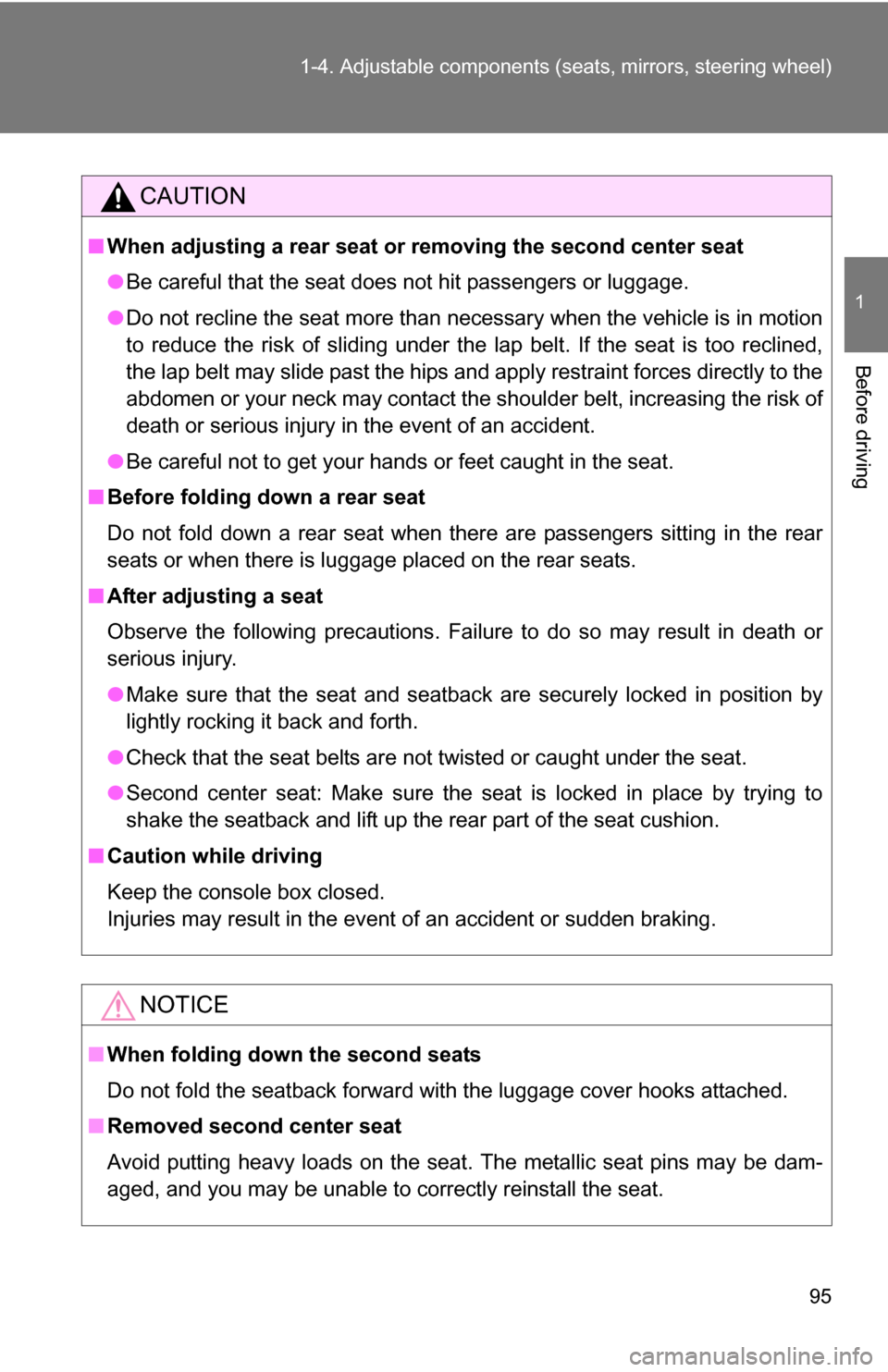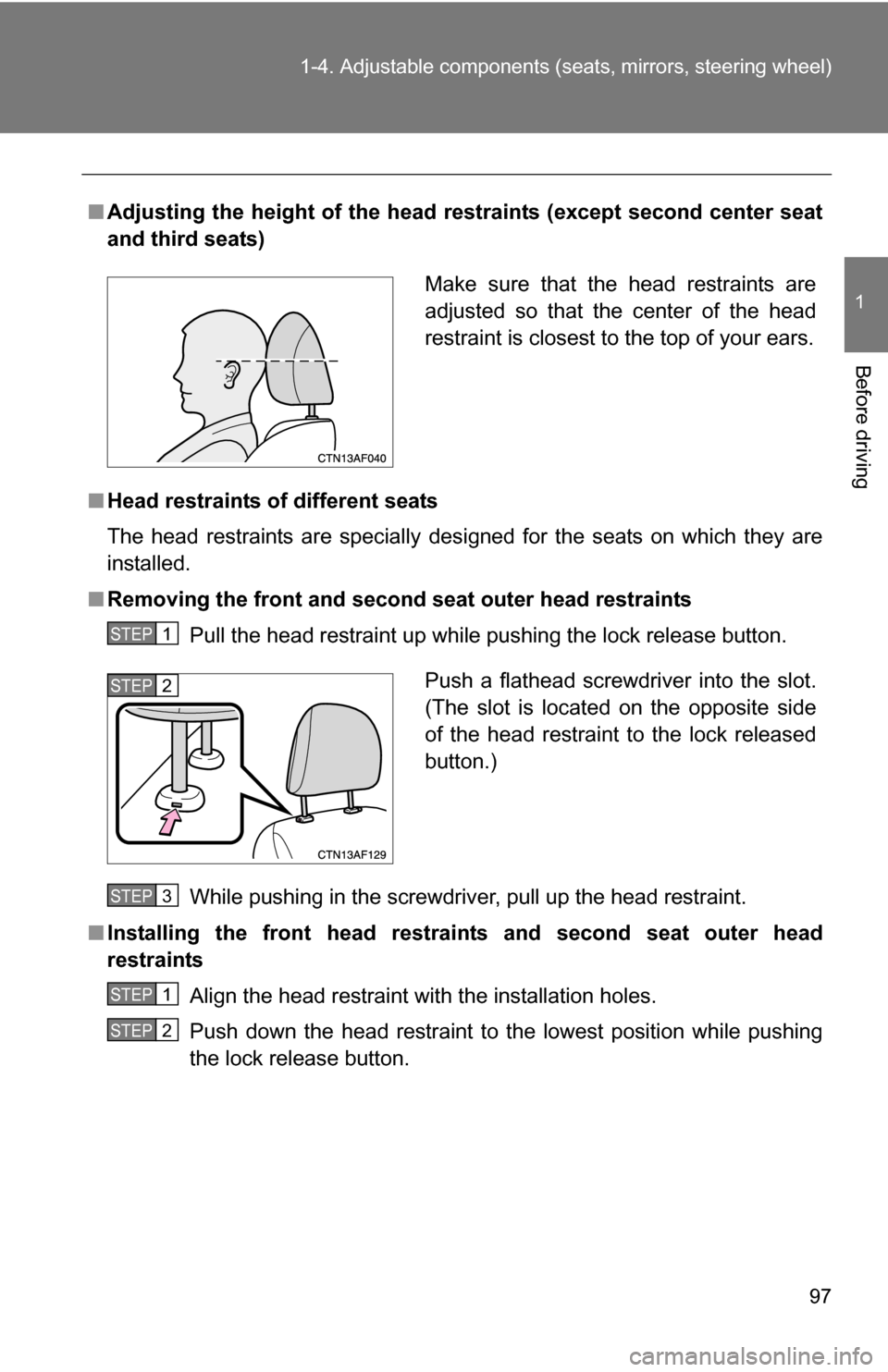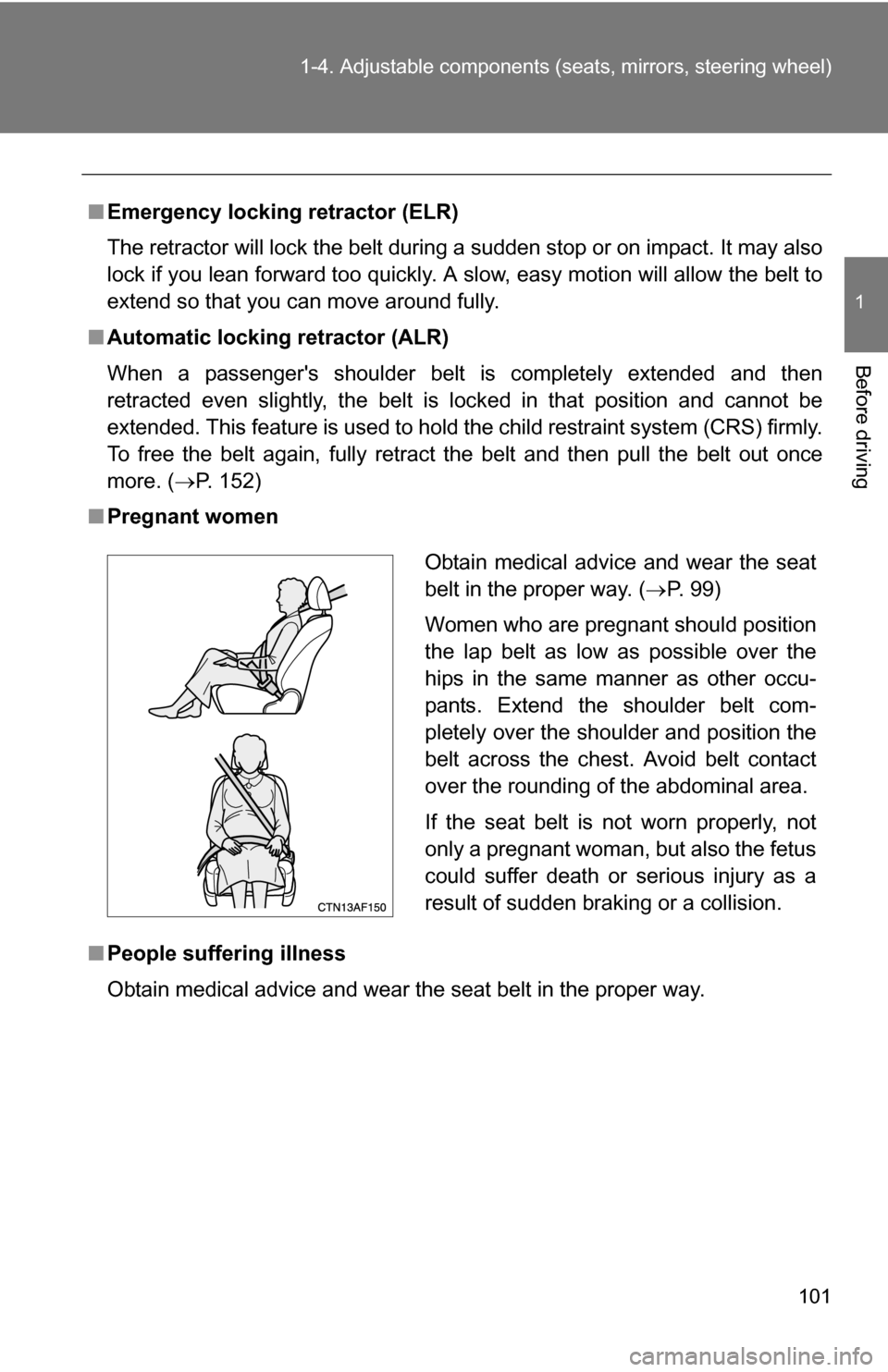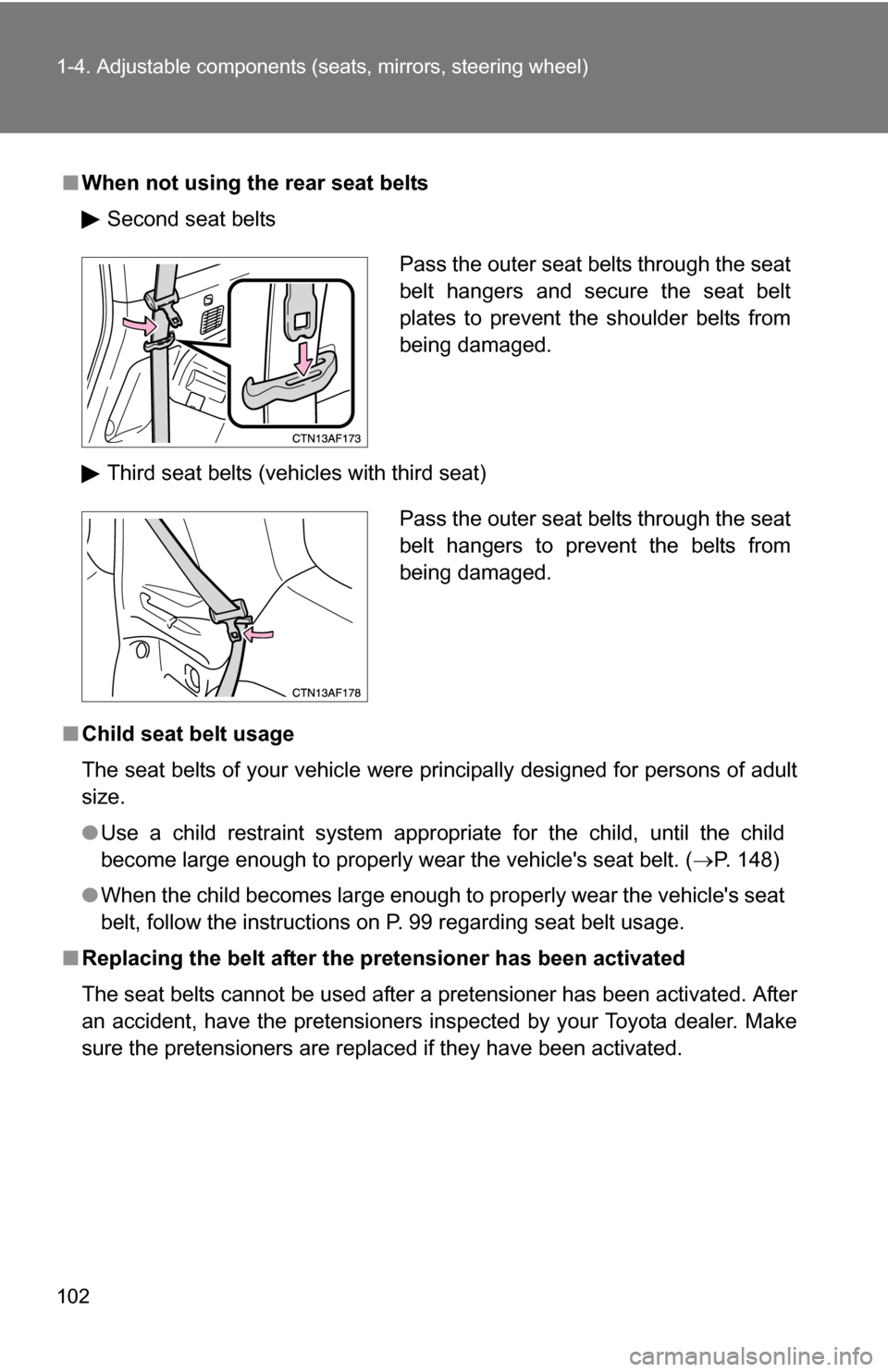Page 95 of 580

95
1-4. Adjustable components (s
eats, mirrors, steering wheel)
1
Before driving
CAUTION
■When adjusting a rear seat or removing the second center seat
● Be careful that the seat does not hit passengers or luggage.
● Do not recline the seat more than necessary when the vehicle is in motion
to reduce the risk of sliding under the lap belt. If the seat is too reclined,
the lap belt may slide past the hips and apply restraint forces directly to the
abdomen or your neck may contact the shoulder belt, increasing the risk of
death or serious injury in the event of an accident.
● Be careful not to get your hands or feet caught in the seat.
■ Before folding down a rear seat
Do not fold down a rear seat when there are passengers sitting in the rear
seats or when there is luggage placed on the rear seats.
■ After adjusting a seat
Observe the following precautions. Failure to do so may result in death or
serious injury.
●Make sure that the seat and seatback are securely locked in position by
lightly rocking it back and forth.
● Check that the seat belts are not twisted or caught under the seat.
● Second center seat: Make sure the seat is locked in place by trying to
shake the seatback and lift up the rear part of the seat cushion.
■ Caution while driving
Keep the console box closed.
Injuries may result in the event of an accident or sudden braking.
NOTICE
■When folding down the second seats
Do not fold the seatback forward with the luggage cover hooks attached.
■ Removed second center seat
Avoid putting heavy loads on the seat. The metallic seat pins may be dam-
aged, and you may be unable to correctly reinstall the seat.
Page 96 of 580
96
1-4. Adjustable components (seats, mirrors, steering wheel)
Head restraints
■Adjusting the head restraints
Front seats
Vertical adjustment
To raise: Pull the head
restraints up.
To lower: Push the head
restraints down while pressing
the lock release button.
Angle adjustment
Second seats Vertical adjustment
To raise: Pull the head
restraints up.
To lower: Push the head
restraints down while pressing
the lock release button.
When using the center seat,
raise the head restraint from
the stowed position.
■When using the third seat head restraints (vehicles with
third seats)
To u s e
To f o l d
Lock release button
Lock release buttons
Page 97 of 580

97
1-4. Adjustable components (s
eats, mirrors, steering wheel)
1
Before driving
■Adjusting the height of the head restraints (except second center seat
and third seats)
■ Head restraints of different seats
The head restraints are specially designed for the seats on which they are
installed.
■ Removing the front and second seat outer head restraints
Pull the head restraint up while pushing the lock release button.
While pushing in the screwdriver, pull up the head restraint.
■ Installing the front head rest raints and second seat outer head
restraints
Align the head restraint with the installation holes.
Push down the head restraint to the lowest position while pushing
the lock release button.
Make sure that the head restraints are
adjusted so that the center of the head
restraint is closest to the top of your ears.
STEP1
Push a flathead screwdriver into the slot.
(The slot is located on the opposite side
of the head restraint to the lock released
button.)STEP2
STEP3
STEP1
STEP2
Page 98 of 580
98 1-4. Adjustable components (seats, mirrors, steering wheel)
CAUTION
■Head restraint precautions
Observe the following precautions regarding the head restraints. Failure to
do so may result in death or serious injury.
●Adjust the head restraints to the correct position at all times.
● After adjusting the head restraints, push down on them and make sure
they are locked in position.
● Do not drive with the head restraints removed.
Page 99 of 580
99
1
1-4. Adjustable components (seats, mirrors, steering wheel)
Before driving
Seat belts
Make sure that all occupants are wearing their seat belts before driv-
ing the vehicle.
■Correct use of the seat belts
●Extend the shoulder belt so
that it comes fully over the
shoulder, but does not
come into contact with the
neck or slide off the shoul-
der.
● Position the lap belt as low
as possible over the hips.
● Adjust the position of the
seatback. Sit up straight
and well back in the seat.
● Do not twist the seat belt.
■ Fastening and releasing the seat belt
Fastening the belt
Push the tab into the buckle
until a clicking sound is heard.
Releasing the belt
Press the release button.
Release button
Page 100 of 580
100 1-4. Adjustable components (seats, mirrors, steering wheel)
Seat belt pretensioners (front seats)
The pretensioner helps the seat
belt to quickly restrain the occu-
pant by retracting the seat belt
when the vehicle is subjected to
certain types of severe frontal
collision or a vehicle rollover.
The pretensioner may not acti-
vate in the event of a minor frontal
impact, a side impact or a rear
impact.
■Adjusting the height of the belt (front seats)
Down
Up
Move the height adjuster up
and down as needed until you
hear a click.
Page 101 of 580

101
1-4. Adjustable components (s
eats, mirrors, steering wheel)
1
Before driving
■Emergency locking retractor (ELR)
The retractor will lock the belt during a sudden stop or on impact. It may also
lock if you lean forward too quickly. A slow, easy motion will allow the belt to
extend so that you can move around fully.
■ Automatic locking retractor (ALR)
When a passenger's shoulder belt is completely extended and then
retracted even slightly, the belt is locked in that position and cannot be
extended. This feature is used to hold the child restraint system (CRS) firmly.
To free the belt again, fully retract the belt and then pull the belt out once
more. ( P. 152)
■ Pregnant women
■ People suffering illness
Obtain medical advice and wear the seat belt in the proper way.
Obtain medical advice and wear the seat
belt in the proper way. ( P. 99)
Women who are pregnant should position
the lap belt as low as possible over the
hips in the same manner as other occu-
pants. Extend the shoulder belt com-
pletely over the shoulder and position the
belt across the chest. Avoid belt contact
over the rounding of the abdominal area.
If the seat belt is not worn properly, not
only a pregnant woman, but also the fetus
could suffer death or serious injury as a
result of sudden braking or a collision.
Page 102 of 580

102 1-4. Adjustable components (seats, mirrors, steering wheel)
■When not using the rear seat belts
Second seat belts
Third seat belts (vehicles with third seat)
■ Child seat belt usage
The seat belts of your vehicle were principally designed for persons of adult
size.
●Use a child restraint system appropriate for the child, until the child
become large enough to properly wear the vehicle's seat belt. ( P. 148)
● When the child becomes large enough to properly wear the vehicle's seat
belt, follow the instructions on P. 99 regarding seat belt usage.
■ Replacing the belt after the pretensioner has been activated
The seat belts cannot be used after a pretensioner has been activated. After
an accident, have the pretensioners inspected by your Toyota dealer. Make
sure the pretensioners are replaced if they have been activated.
Pass the outer seat belts through the seat
belt hangers and secure the seat belt
plates to prevent the shoulder belts from
being damaged.
Pass the outer seat belts through the seat
belt hangers to prevent the belts from
being damaged.